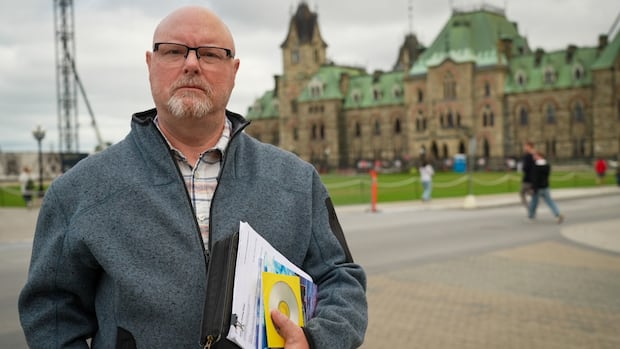A retired Canadian Armed Forces legal officer says he’s appalled by Canada’s “deplorable” failure to bring his former Afghan colleagues to safety — four years after they applied for consideration under a special immigration stream designed specifically for those who assisted the Canadian government.
This comes as a Federal Court judge’s recent decision in a separate case calls out Immigration, Refugees and Citizenship Canada (IRCC) and Global Affairs Canada for “failure” of duties and “gross governmental negligence” in implementing that very program.
That’s why retired major Cory Moore is among Canadian lawyers calling on the government to turn back the clock and take another look at Afghans who were outright ignored.
“It’s been nothing short of deplorable, and quite honestly shameful,” said Moore, standing in front of Parliament Hill. “It’s really quite appalling for a program that was designed to safeguard [these] lives … for them to be completely ignored by this government.”
The temporary program was set up a few weeks before Kabul fell to Taliban control in August 2021. It was open to Afghan nationals who assisted the Canadian government, such as interpreters or embassy staff — but was “not limited to” those professions.
That year, Moore helped 12 of his former colleagues and their families submit initial applications, expressing their interest in the program.
They got ghosted by the federal government — no followups, no nothing.- Tamar Boghossian, Ottawa lawyer
The group includes military prosecutors, criminal investigators, security staff, recruitment video participants, a doctor and a journalist — all who worked “shoulder to shoulder” with Moore and were involved in various capacities during his mission to help bolster the Afghan National Army’s legal branch.
His project aimed to draft Afghan law grads through a recruitment video which aired nationally from 2012 to 2021.
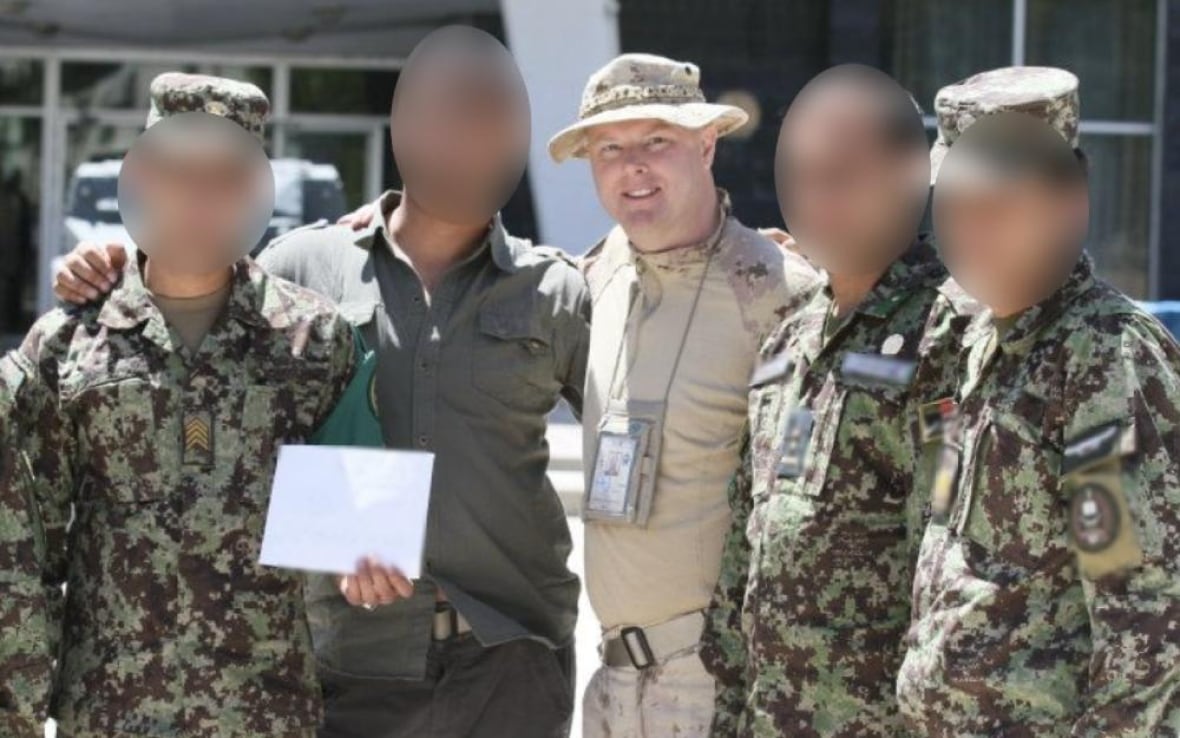 Moore, centre, stands with military colleagues in Afghanistan. Moore says the federal government has failed a group of 12 of his former Afghan peers and is calling on the government to act, despite the special pathway now long closed. (Submitted by Cory Moore)
Moore, centre, stands with military colleagues in Afghanistan. Moore says the federal government has failed a group of 12 of his former Afghan peers and is calling on the government to act, despite the special pathway now long closed. (Submitted by Cory Moore)
Some of those female lawyers ended up prosecuting Taliban members accused of infiltrating the Afghan army and sexually assaulting nurses, said Moore.
“Without their assistance, which was indispensable, I could not have achieved my mission,” Moore said. “I’m proud to have … met them and worked with them.”
Three years after first speaking to CBC News about his frustrations, Moore said the group is at a standstill. Most applicants remain in Afghanistan, while some managed to escape but “are stuck” in neighbouring countries such as Pakistan where conditions remain difficult, Moore said.
“They’re still in hiding. They’re still moving on a month-to-month basis,” said Moore.
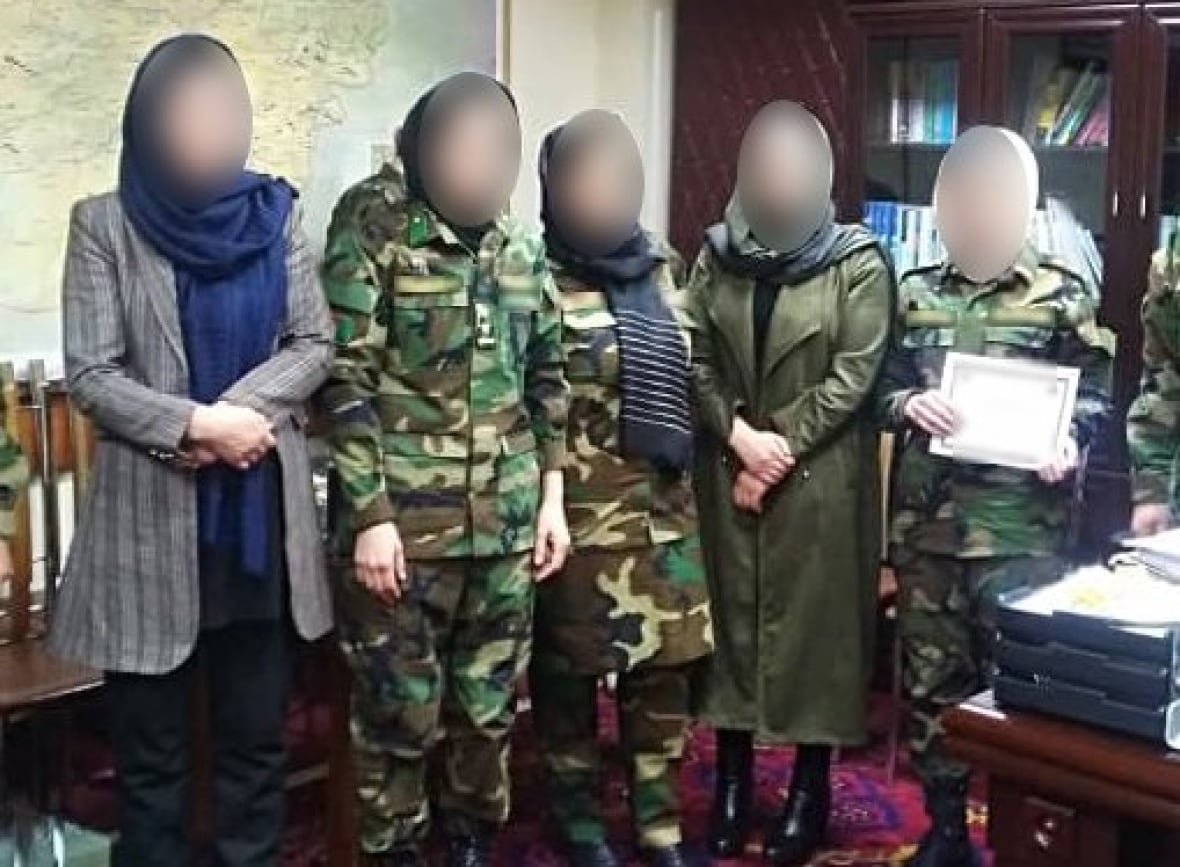 Five of the eight female military lawyers recruited by former Canadian Armed Forces legal officer Cory Moore during his mission in Afghanistan. (Submitted by Cory Moore)
Five of the eight female military lawyers recruited by former Canadian Armed Forces legal officer Cory Moore during his mission in Afghanistan. (Submitted by Cory Moore)
Global Affairs and the Department of National Defence were given the authority to vet expressions of interest under the program and tasked with referring eligible Afghans to IRCC, which would then issue a formal invitation to apply.
The program shut down in 2022 and was capped at 18,000 spots, drawing criticisms from Conservative critics and advocates. Some 15,505 Afghans arrived through this special measure as of November 2024, according to the government.
None of the 12 in Moore’s group received an invitation, however. Moore said they only ever received automated replies despite multiple followups, refiling of applications and access to information requests.
“They got ghosted by the federal government — no followups, no nothing,” said Ottawa immigration lawyer Tamar Boghossian, who’s been helping Moore with the case. “These individuals remain abandoned.”
 Tamar Boghossian is an immigration lawyer in Ottawa and a partner of Boghossian Morais LLP. She’s critical of the government’s lack of transparency and response to the 12 applications she helped submit. (Salah Tebessi/CBC)
Tamar Boghossian is an immigration lawyer in Ottawa and a partner of Boghossian Morais LLP. She’s critical of the government’s lack of transparency and response to the 12 applications she helped submit. (Salah Tebessi/CBC)
Over the years, Moore said he and others in the group emailed every sitting member of Parliament asking for help, but only got one phone call back.
“I just find it incredible that I can literally move mountains over in Kabul,” Moore said, referring to meetings he had with Afghan officials during his mission. “And yet, I can’t move the ball forward in any way, shape or form here in my own country.”
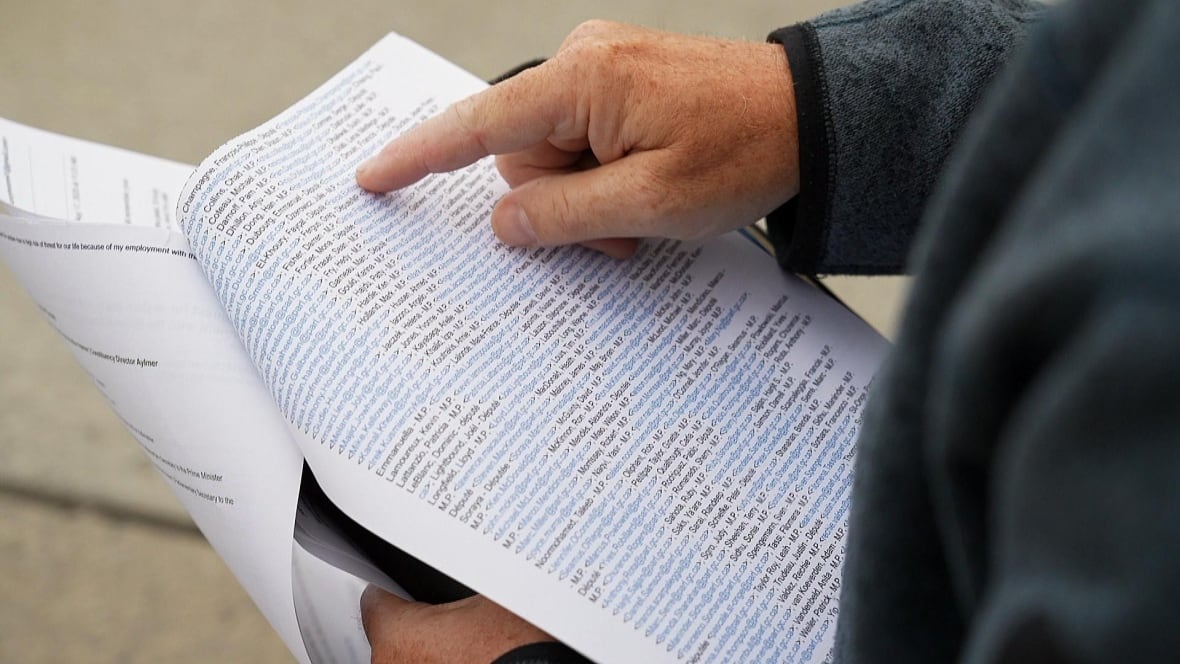 Moore shows a printout of emails he and his Afghan colleagues sent to every sitting member of Parliament, pleading for help after they were ignored by IRCC under a temporary program designed to help Afghan nationals who assisted the Canadian government. (Mathieu DeRoy/CBC)’Groundbreaking’ ruling brings hope: lawyer
Moore shows a printout of emails he and his Afghan colleagues sent to every sitting member of Parliament, pleading for help after they were ignored by IRCC under a temporary program designed to help Afghan nationals who assisted the Canadian government. (Mathieu DeRoy/CBC)’Groundbreaking’ ruling brings hope: lawyer
In July, a Federal Court judge ruled in favour of an Afghan applicant, saying there was “gross governmental negligence” when departments ignored his initial expression of interest.
Maureen Silcoff’s client, referred to as Mr. D in the Federal Court decision, filed an application for a writ of mandamus — a judicial remedy used to compel a government body to perform a duty under the law.
Mr. D was never referred to IRCC by Global Affairs, and he never got a formal invitation to apply to that special program. He received “almost only autoreplies, despite 17 follow-up inquiries,” the decision reads.
“From the initial expression of interest, there was a legal duty for the government to process the application,” explained Silcoff, a partner at Silcoff Shacter, summarizing the findings.
The court found the government is accountable for the program “from day one,” Silcoff said. The ministries also “failed” in their duties, the judge wrote.
The Federal Court ordered the government to “promptly” process his expression of interest as if the program was still open, and awarded Silcoff’s client $15,000 in costs, stating he had a “right to a proper and fair process.”
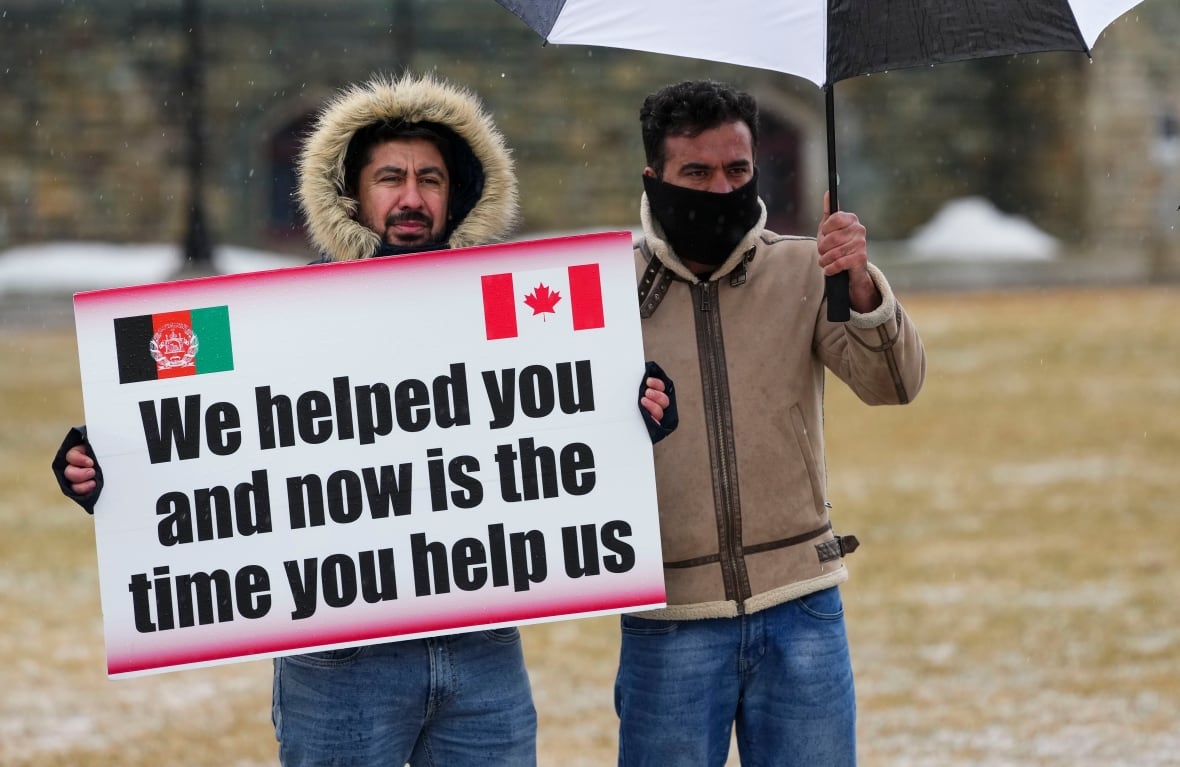 Former Afghan interpreters stage a hunger strike on Parliament Hill in Ottawa in March 2022. The group that helped the Canadian military said the federal government lied to them about bringing family members to Canada, and that people have died while waiting for paperwork to be processed. (Sean Kilpatrick/The Canadian Press)
Former Afghan interpreters stage a hunger strike on Parliament Hill in Ottawa in March 2022. The group that helped the Canadian military said the federal government lied to them about bringing family members to Canada, and that people have died while waiting for paperwork to be processed. (Sean Kilpatrick/The Canadian Press)
“It’s groundbreaking,” Silcoff said. “This court decision gives people a future.”
She urged IRCC to take another look at applicants like Moore’s Afghan peers under this special program — without having to pursue a mandamus in Federal Court like her client did, because it’s inaccessible and “extremely difficult” for people in hiding.
Boghossian agrees and said the Federal Court decision is a “big win.”
“But justice shouldn’t depend on who can afford a lawyer. The government must show it can process these cases fairly without forcing vulnerable individuals to fight every step of the way,” said Boghossian.
Boghossian said her clients are weighing their next steps.
IRCC, DND decline comment on 12 Afghans
Meanwhile, Moore is calling on IRCC, Global Affairs and National Defence to step up and voluntarily reassess these cases that “fell through the cracks.”
“We have left people behind incorrectly, wrongly, unethically, and no one is willing to do anything about it,” he said. “It’s awful and it needs to change.”
IRCC declined an interview and did not respond to those specific calls.
In an email, it cited privacy and safety concerns as reasons it can’t comment on the 12 individuals.
IRCC says it’s continuing to prioritize processing applications it already received, and said Afghans who weren’t part of the special streams can apply under regular immigration programs.
“We are doing everything we can to help Afghans inside and outside of Afghanistan,” a spokesperson wrote, adding Canada welcomed more than 59,000 Afghans since August 2021.
In an email, National Defence didn’t address the 12 applicants, but said it passed on applicants to IRCC whose employment with the Canadian Armed Forces was confirmed to have “a significant and enduring relationship” with the forces.
Global Affairs declined CBC’s request for comment.

